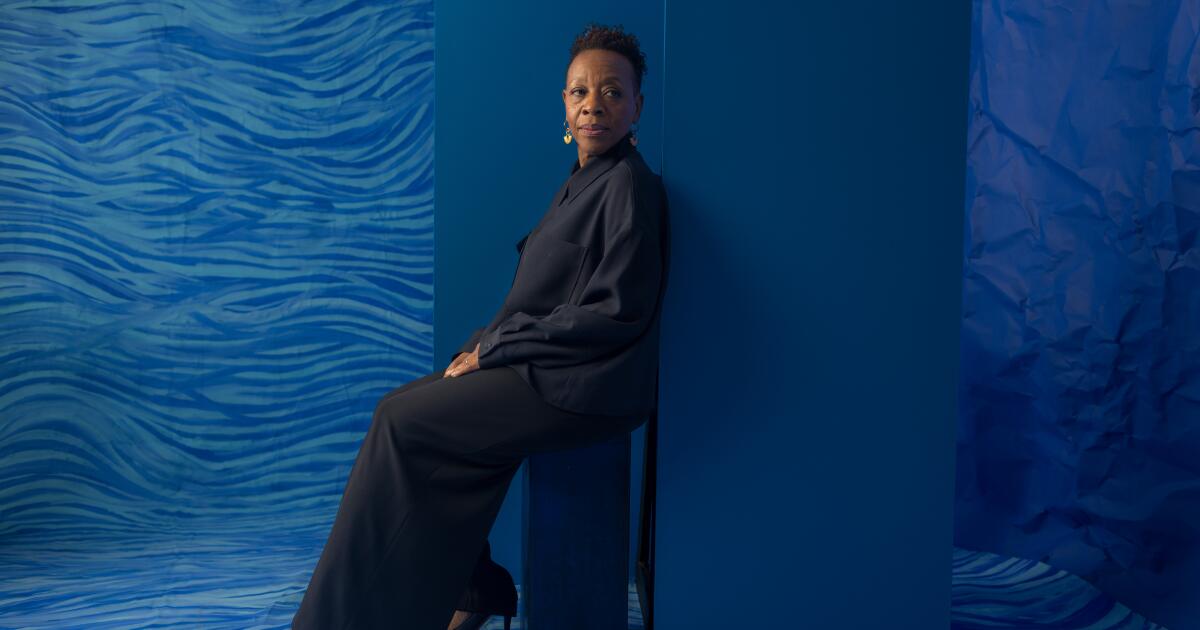Actors on a Mike Leigh film set don’t talk about motivation, and that’s fine by “Hard Truths” star Marianne Jean-Baptiste, who relishes the rehearsal process on his movies. In the latest film from the Oscar-nominated British filmmaker, she delivers an astounding performances as Pansy — a rage-filled, depressive housewife trapped inside her pain — while her hairdresser sister Chantelle (Michele Austin) is more upbeat. By the time “action” is called on a Leigh film, it becomes clear, motivation talk is pointless.
“We just do it, because we’ve built a world right up until the film starts,” says the London-born Jean-Baptiste, Oscar-nominated for Leigh’s “Secrets & Lies” and now based in Los Angeles. “There’s a history behind everything that comes out of our mouths. Nobody forgets their lines, because you’ve lived it.” In a recent conversation, the actor describes how she built the character of Pansy, married to taciturn Curtley (David Webber) with an adult son named Moses (Tuwaine Barrett), and her cheeky relationship with Leigh.
How did Mike Leigh contact you for this?
He sent an email. “Let’s work together again. Don’t know what it’s about. But we’ll have a great time.” That’s how he sells it. We actually were going to shoot something before the pandemic, but it scuppered our plans. When you could work with restrictions, he was like, “I can’t work like that.”
Characters from scratch are what Leigh’s famed rehearsal process is known for, but how extensive is the dossier?
You psychoanalyze a list of people you bring in — it could be a woman from [the store], someone you saw on the street. But no close relatives. Then you describe everyone’s characteristics, what they do, then that list gets whittled down, and then you do an exercise where you meld them into one person, physically. Then you become a writer, a production designer, a costume designer. You start from their first memory, then create every aspect in finite detail. You’re building an encyclopedia of facts for when you start to improvise. It’s done in isolation with each actor. Then Michele Austin will come into the rehearsal, and Mike will say, “Aha! Surprise, surprise, you’re playing sisters in this world!”
Michele had a scene with you in “Secrets & Lies.” When did you learn she’d be in this one?
When she walked into that room. Then we work on a combined history of our lives: aunts, uncles, our outings, Sunday dinners, where we sat, who liked church, who didn’t — with each of us popping out so that we don’t know certain things. We fantasized about so many things that didn’t come to pass. Michele and I were convinced we would be running a Caribbean takeaway together! And in that time, other people come in, like David Webber as Curtley, [Pansy’s] husband, so you start another history.
How does Leigh say no to an idea?
I’m very cheeky with him. On “Secrets & Lies,” since I’d done a play with him before, I knew I’d have to choose a career for Hortense. I was like “Oh, she’s a pilot.” And he went, “You’re not going to have flying lessons.” Awww! [Laughs] But I was so jealous that Michele got to do hairdressing. I just did lots of cleaning. I compared cleaning products.
Pansy’s unhappiness is so coiled, then explosive. What helped you unlock her?
She doesn’t like being in the world. Everything is a potential threat. She’s very observant, but innocent actions turn into something dangerous to her. All her observations get twisted. “Why are you opening the door for me? I’m not letting you walk behind me!” And when she’s in bed after her rampage at the supermarket, she recounts her day, and you think, “My God, you believe that actually happened to you.” The first time I watched it, I was so anxious, like, “Somebody’s going to hit her.” And then, obviously, I go, “Well, nobody did, because I was there.”
Yet you never know completely how your work fits into the whole movie? Even whether you’re a lead or not?
No. I knew he wasn’t going to fly me from Los Angeles only to do a couple of scenes. But I also know it’s a fluid process. Things shift. If something takes over, and he wants to go there, he’ll go. You have to park your ego when working with him, because it really is about everybody. Everybody has to feel like they’re the center of this movie for it to work right, because he does [this process] with all the characters. But until you see the movie, you’ve got no clue. I was obsessed, for instance, with wanting to know where Moses was going on his walks!
It sounds like this way of making movies isn’t for everyone.
The process is the most important part, and I’ve got friends who go, “I couldn’t do it.” But I trust him like family. I mean, damn, if I could work like this all the time? If they’d said, after the rehearsal period, we’re not going to be able to put the show on, I’d be like, “Good.” I did the rehearsals, I’m happy. It’s the investigation, trying things in a safe space. Working with him, you get to use much more of your talent than in any other sort of job.

